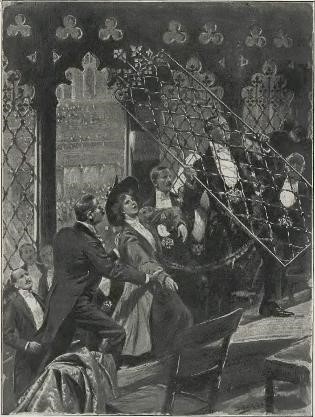So Who Was Muriel Matters?

Muriel Matters was an Australian born teacher and courageous activist. She campaigned fiercely for the right of women to participate fully in society by having the right to vote. She also championed women and children’s rights and living standards more broadly, but was largely forgotten until South Australian MP, Frances Bedford realised who she was, where she came from and what a great contribution she had made for the suffrage movement in the UK.
Frances has tirelessly researched and promoted Muriel’s life through the Muriel Matters Society Inc. and has been instrumental in the production of a film about Muriel’s life, a book and a play written and performed. Frances also located the grille from the House of Commons to which Muriel had chained herself and has had it relocated to Parliament House in Adelaide where it is now on display.
Muriel Lilah Matters was born on 12 November 1877 at Bowden, Adelaide, third of ten children. As a young adult she studied music and elocution and moved to Sydney and Melbourne, working as an actress.
In 1905 she left for London to further her acting career, but soon abandoned acting and joined the Women’s Freedom League in 1907.
In 1908 she took the first ‘Votes for Women’ caravan on a tour of villages in the south of England.
On 28 October she gained notoriety by chaining herself to an iron grille in the ladies’ gallery of the House of Commons and declaring women’s suffrage aims. She was removed, still attached to the grille, and sent to Holloway Prison for a month.
On February 16, 1909 she flew over London in an airship inscribed ‘Votes for Women’, scattering handbills. The suffragists had been told they could not distribute leaflets on the streets so they intended to drop the campaign leaflets on to the procession of King Edward VII as he made his way in his carriage along The Mall to the opening of Parliament. The wind did not cooperate, none the less the stunt was a great success.
The following year back in Australia, she lectured in several states on feminism and socialism and helped secure a resolution from the Australian Senate to the British Prime Minister detailing the good results from the enfranchisement of Australian women.
In London in 1911 she helped to form a women’s settlement to further educational opportunities in the Lambeth slums.
In 1916 she attended a training course by educationalist Maria Montessori in Barcelona and began to promote the education for the children of the poor.
She lived for most of her later life in Hastings where she died on 17 November 1969.
While Muriel’s courage and activism was outstanding, we must thank Frances Bedford for ensuring that a hundred years on Muriel still matters.
For more information about Muriel Matters and the Muriel Matters Society Inc., visit https://murielmatterssociety.com.au/


